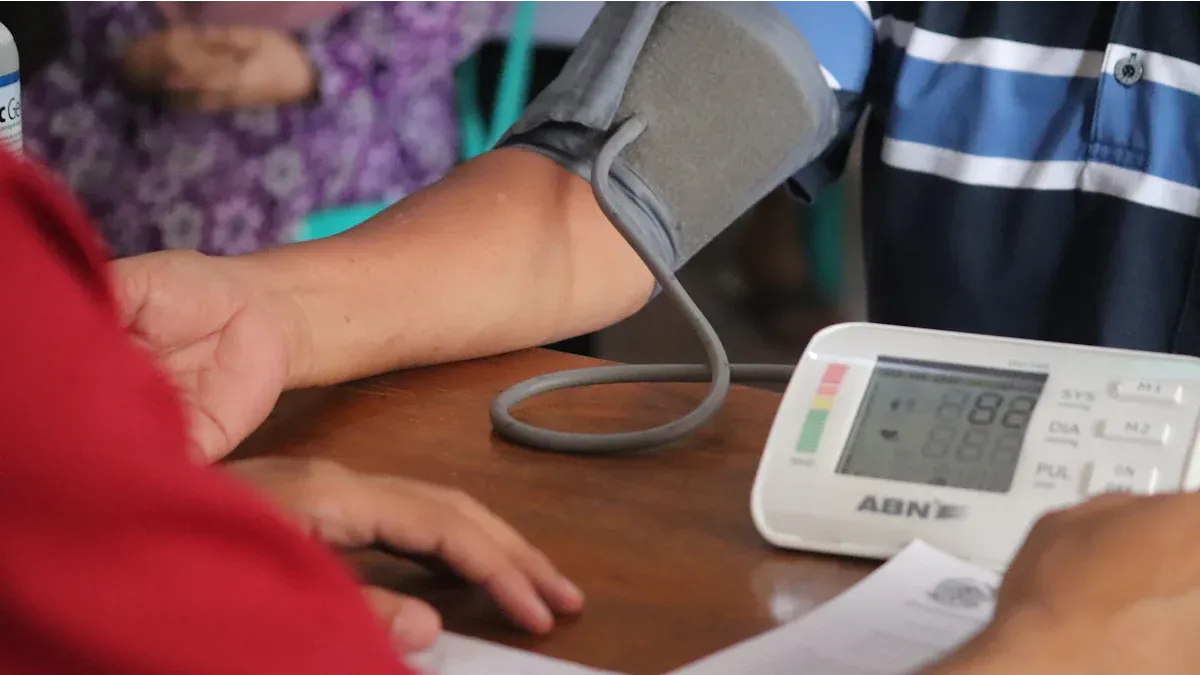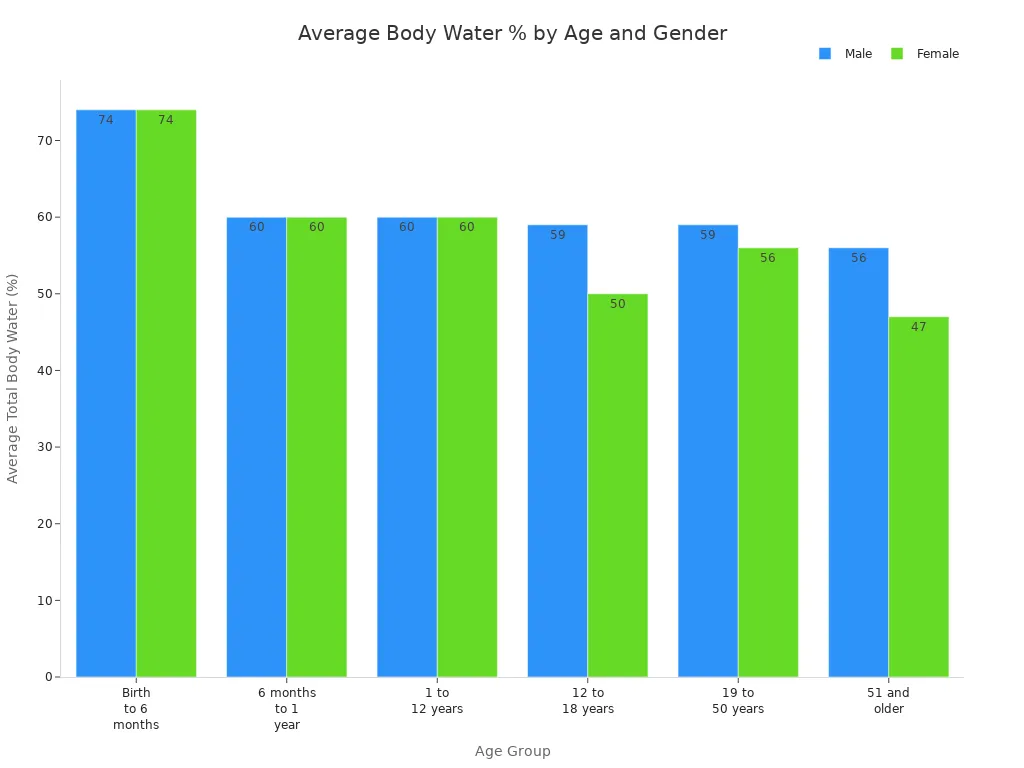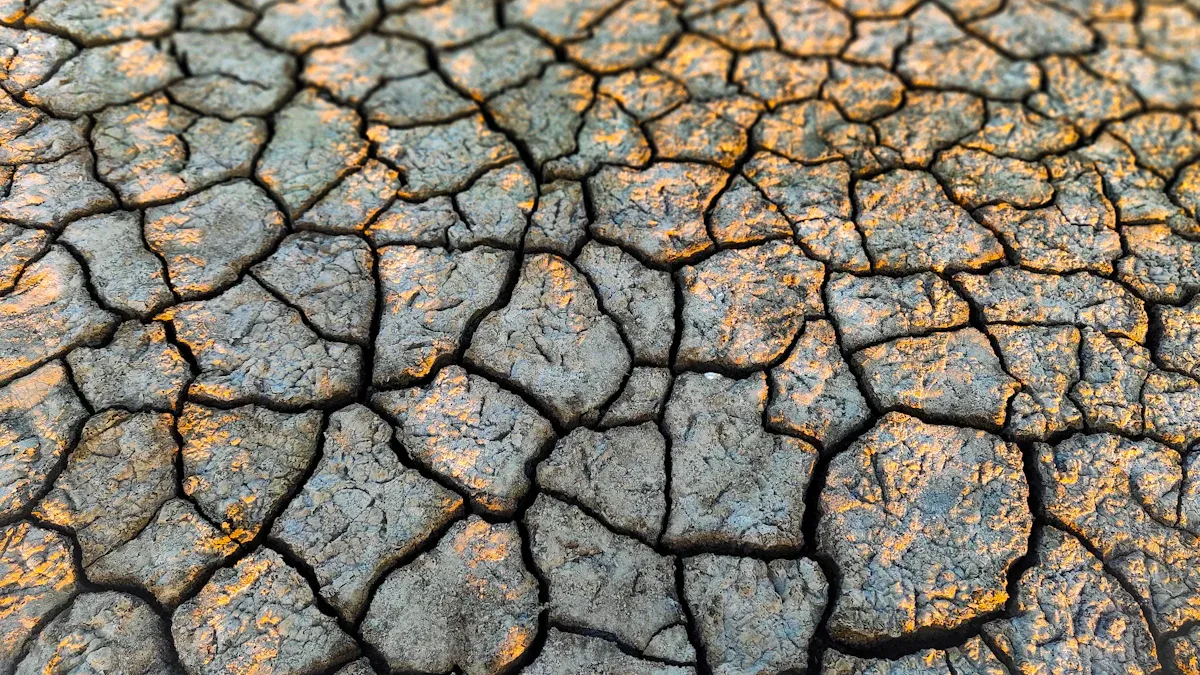- All
- Product Name
- Product Keyword
- Product Model
- Product Summary
- Product Description
- Multi Field Search
Views: 0 Author: Site Editor Publish Time: 2025-07-11 Origin: Site
Dehydration can make your blood pressure go up. If you do not drink enough fluids, your blood gets thicker. Your heart has to work harder to move thick blood. Sometimes, dehydration can also make your blood pressure go down. This happens if you lose a lot of fluids fast. Many adults get dehydrated each year. Older adults have a bigger risk. Studies say up to 48% of older adults in hospitals are always dehydrated. Knowing the signs of dehydration and blood pressure changes can help you. It helps you keep your heart safe and your blood pressure healthy. Drinking enough water is good for your health. Learning about dehydration and blood pressure can help you stop big problems.
Dehydration can make your blood pressure go up or down. It does this by making your blood thicker. Thicker blood is harder for your heart to pump.Your body uses hormones like vasopressin to save water. These hormones also tighten your blood vessels. This can make your blood pressure go up if you stay dehydrated.Older adults and people with heart problems are at higher risk. They can have more trouble from dehydration and blood pressure changes.Drink enough water every day. Women need about 9 cups. Men need about 13 cups. This helps keep your blood pressure steady. It also helps protect your heart.Watch for signs like thirst, dark urine, dizziness, or headaches. Get medical help if these symptoms get very bad.

Your body has a lot of water in it. Water is a big part of your blood. It helps move nutrients and oxygen to your organs. How much water you have changes as you get older. It also depends if you are male or female. Babies have the most water in their bodies. Older adults have less water. Males usually have more water than females. This is because males have more muscle and less fat. You can see these differences in the chart below:

If you sweat, get sick, or do not drink enough, you lose water. When this happens, your blood volume goes down. This means your heart has less blood to pump. Blood volume helps keep your blood pressure steady. If you do not have enough fluids, your blood gets thicker. Thick blood is harder for your heart to move.
Dehydration and blood pressure are closely linked. When you lose water, your blood pressure can drop at first. You might feel dizzy or tired. Your body tries to fix this by making your blood vessels smaller. This is called vasoconstriction. It helps bring your blood pressure back up. If you stay dehydrated, your blood vessels stay tight. Your heart has to work harder. Over time, this can cause high blood pressure.
“When you’re dehydrated, your body’s water supply is depleted, leading to reduced blood volume and low blood pressure. This can cause symptoms like dizziness, fainting, and fatigue. In extreme cases, low blood pressure from dehydration can cause heart or brain damage. The body may respond by constricting blood vessels to raise blood pressure, but this compensatory mechanism can lead to dangerous fluctuations and increase the risk of hypertension over time.” — Dr. Luke Laffin, Preventive Cardiologist
Dehydration and blood pressure changes can happen fast or slow. At first, you may notice low blood pressure. If you do not drink more fluids, your body’s response can cause high blood pressure. This is more common in older adults and people with heart problems. Keeping a good balance of fluids is important for your health.
You may wonder how dehydration and blood pressure are linked. When you lose water, your blood volume drops. This makes your blood thicker and harder to move. Your heart has to work more to push thick blood. This can make your blood pressure go up. Here are the main ways dehydration can cause high blood pressure:
Your blood volume drops, so your blood gets thicker.
Your body sends out hormones that make blood vessels smaller.
Your kidneys try to keep more water and salt, raising blood pressure.
The sodium in your blood goes up, making fluid balance harder.
If you stay dehydrated, your heart and blood vessels get stressed, which can cause long-term blood pressure problems.
Dehydration and blood pressure changes can happen fast or slowly. If you do not drink enough water, your body tries to fix it. But these fixes can make blood pressure rise. This link between dehydration and blood pressure matters for everyone, especially if you already have blood pressure problems from hydration.
Your body uses a hormone called vasopressin to help with water balance. When you get dehydrated, your brain tells your body to make more vasopressin. This hormone makes your kidneys save water. It also makes your blood vessels smaller, which is called vasoconstriction. When blood vessels get smaller, your blood pressure goes up.
Tip: If you feel thirsty, your body has already started making vasopressin. Try to drink water before you feel very thirsty.
Vasopressin stays low when you have enough water. When you lose about 8% of your blood volume, vasopressin rises fast. This hormone acts on your blood vessels, making them tighter. This keeps your blood pressure from dropping too low, but it can also cause high blood pressure if you stay dehydrated. The effect is even stronger in your skin, muscles, and organs, as your body tries to protect your heart and brain.
Dehydration can cause high blood pressure and other problems, especially if you already have hypertension. When your blood gets thicker, your heart works harder. Your blood vessels stay tight, and your kidneys may not work as well. This can lead to more serious dehydration problems.
Here are some risks you should know:
Your heart rate can go up, making your heart work harder.
Your kidneys may not remove waste as well, which can cause kidney damage.
You may have a higher chance of getting kidney stones or urinary tract infections.
If you already have high blood pressure, dehydration can make it harder to control.
Older adults and people with heart problems face even bigger risks.
Aspect | Explanation | Impact on People with Hypertension |
|---|---|---|
Blood concentration | Blood gets thicker and harder to pump | Heart works harder, raising blood pressure |
Hormonal response | Hormones make blood vessels smaller | Blood pressure goes up, harder to manage |
Heart strain | Heart beats faster to move thick blood | Increases risk of heart problems |
Importance of hydration | Drinking water keeps blood pressure steady | Helps manage hypertension and prevent problems |
If you have high blood pressure, you need to watch how much water you drink. Dehydration and blood pressure problems can cause serious health issues, like heart attacks or strokes. Always check for changes in blood pressure and stay hydrated to lower your risk.

It is important to spot dehydration early. These signs can show up fast if you do not drink enough water. Look for these common symptoms:
Thirst
Dry or sticky mouth
Dark yellow or amber urine
Less urine than usual
Headache
Dizziness
Feeling tired or slow
Muscle cramps
Dry, cool skin
Not feeling hungry
The color of your urine can help you know. If your urine is dark, you may need more water. Kids might not have tears when they cry or have fewer wet diapers. If you see these signs, drink water as soon as you can.
High blood pressure is hard to notice. Most people do not feel anything until it gets bad. Dehydration can make your blood pressure go up, but you might not know right away. Sometimes, you may get a headache, feel dizzy, or feel tired. Rarely, you could have a nosebleed, get confused, or have trouble seeing. The table below shows which symptoms are the same:
Symptom Category | Symptoms |
|---|---|
Common Dehydration Symptoms | Thirst, dry mouth, headache, fatigue, dizziness, dark urine, dry skin |
Severe High Blood Pressure | Severe headaches, nosebleeds, confusion, vision problems, chest pain |
Overlapping Symptoms | Headache, dizziness, fatigue, confusion |
You should check your blood pressure often if you have had high blood pressure or dehydration before.
Sometimes, you need a doctor for dehydration or blood pressure changes. Call your doctor if you have any of these warning signs:
Diarrhea that lasts more than one day
You cannot keep fluids down
Fast heartbeat
Very tired, confused, or mixed up
Black or bloody poop
If you feel lightheaded, sick to your stomach, or cannot see well, get help. Call 911 if you see shock signs like cold skin, fast breathing, or confusion. If your blood pressure stays high, even if you feel fine, talk to your doctor. Checking your blood pressure often helps you find problems early and stay healthy.
Drinking enough fluids every day helps stop dehydration. It also keeps your blood pressure steady. Most healthy adults need between 2.7 and 3.7 liters of fluids each day. This includes water, other drinks, and foods with lots of water. Men usually need about 13 cups, or 3.1 liters, of fluids daily. Women need about 9 cups, or 2.1 liters. You may need more fluids if you exercise or if it is hot outside. Some health problems can also make you need more fluids. Older adults should watch their hydration. They may not feel thirsty as much as younger people.
Group | Recommended Daily Fluid Intake (cups) | Equivalent in Liters |
|---|---|---|
Men (19+) | 13 | ~3.1 |
Women (19+) | 9 | ~2.1 |
Note: About 20% of your fluids come from food. Drink more if you are active or if it is warm outside.
You can use easy habits to stay hydrated. Drink fluids all day, not just when you feel thirsty. Thirst means your body already needs water. Carry a water bottle and take small sips often. Add fruit slices to your water for more flavor. Eat foods like watermelon, cucumbers, and oranges to get more water. Wear light clothes and stay inside when it is hottest to lose less fluid. Watch for signs of dehydration like dark urine, dry mouth, or feeling tired. Drinks with electrolytes can help you recover faster after sweating or being sick. These drinks replace minerals like sodium and potassium. These minerals help control blood pressure and fluid balance.
If you see signs of dehydration, drink fluids right away. The fastest way to feel better is to drink water slowly and eat foods with lots of water. For bad dehydration, you may need electrolyte drinks or medical help. If you cannot keep fluids down, feel confused, or have a very fast heartbeat, get medical help. People with high blood pressure should watch their hydration and blood pressure closely. You can use smart tools, like those from Lingwen Intelligent, to check your blood pressure and hydration at home. These tools help you recover from dehydration and manage your health better. Always talk to your doctor if you have questions about treatment or if you do not feel better.
Dehydration can make your blood pressure go up in a few ways. First, your body makes hormones like vasopressin and starts the renin-angiotensin-aldosterone system. These hormones make your blood vessels tighter. Second, dehydration makes your blood thicker. Thick blood is harder for your heart to move. Third, your heart and nerves have to work more, which raises blood pressure.
Drinking enough water helps keep your blood pressure normal. It also lowers your chance of heart problems. Studies say people with more salt in their blood from dehydration have more heart risks. You should drink water often and eat foods with lots of water.
Hydration Habit | Benefit |
|---|---|
Drink water throughout the day | Supports healthy blood pressure |
Eat fruits and vegetables | Adds hydration |
Monitor blood pressure | Detects dehydration effects |
Remember, dehydration can happen before you notice. Make drinking water a daily habit to help your heart.
Yes, drinking water can help lower your blood pressure if dehydration caused it. Water increases your blood volume and makes your blood less thick. This helps your heart pump more easily.
You may feel dizzy, tired, or have a headache. If you check your blood pressure and see it is higher than normal, dehydration could be the cause. Watch for dark urine and dry mouth as well.
Older adults, people with heart problems, and those who take certain medicines face the highest risk. You should pay close attention to your fluid intake if you belong to these groups.
Water is best.
You can also drink milk, herbal tea, or drinks with electrolytes.
Avoid drinks with lots of sugar or caffeine.
Eat fruits and vegetables with high water content for extra hydration.